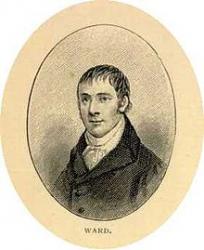
1753 - 1825 Hymnal Number: d80 Author of "From whence doth [does] this [the] union arise" in The Prayer Meeting Hymn Book Baldwin, Thomas. (Bozrah, Connecticut, December 23, 1753--August 29, 1825, Waterville, Maine). Following the death of his father and his mother's remarriage, he moved at age sixteen to Canaan, New Hampshire. He was married in 1775, and while a young man was elected to represent Canaan in the legislature and was repeatedly reelected. Following his conversion he was baptized in 1781. He then abandoned his legal studies and began to preach in 1782, being ordained in the following year and then serving for seven years as an evangelist. In 1790 he became pastor of the Second Baptist Church of Boston. He published a number of books and was the first editor of the Massachusetts Baptist Missionary Magazine, beginning in 1803. For many years he was chosen chaplain of the General Court of Massachusetts, delivering the annual sermon on the general election day in 1802. He was given the M.A. from Brown University in 1794 and the D.D. from Union College in 1803. His death occurred during a visit he made as a trustee to the annual commencement of Waterville College.
See: Chessman, Daniel. (1826). Memoir of Rev. Thomas Baldwin. (Boston).
--Harry Eskew, DNAH Archives
======================================
Baldwin, Thomas, D.D., born at Bozrah, or Norwich, Connecticut, 1753, was representative for some time of his native State in the Legislature. In 1783 he was ordained to the Baptist ministry, and from 1790 till his death, in 1825, he was Pastor of the Second Baptist Church, Boston. His best known hymns are:—
1. Almighty Saviour, here we stand. Holy Baptism. This hymn "For Immersion " was contributed to a Collection of Sacred and Devotional Hymns, Boston, 1808, from whence it has passed into later Collections, including the Baptist Praise Book, N. Y., 1871, and others.
2. From whence does this union rise? Communion of Saints. First found in J. Asplund's New Collection, Baltimore, 1793, beginning, "O whence does this union rise." Formerly very popular, and still in use as in the Baptist Hymn [and Tune] Book, Phila., 1871, No. 638. In the Church Pastorals, Boston, 1864, No. 981, it is altered to "From whence doth this union arise.”
3. Ye happy saints, the Lamb adore. Holy Baptism. For Immersion, first appeared in a Collection of Sacred and Devotional Hymns, Boston, 1808, from whence it passed in an altered form as:—"Come, happy souls, adore the Lamb," into Winchell's Supplement to Watts, 1819. It is found in Spurgeon's Our Own Hymn Book, 1866, and many modern American Baptist collections. [Rev. F. M. Bird, M.A.]
-- John Julian, Dictionary of Hymnology (1907)
============================
Thomas Baldwin


 My Starred Hymns
My Starred Hymns




